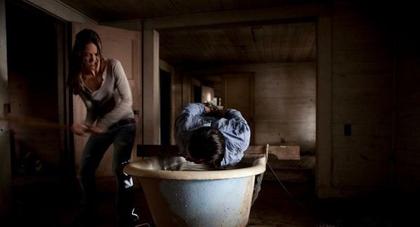FrightFest 2010: I Spit On Your Grave review
The controversy just won’t go away…

Meir Zarchi’s 1978 original I Spit On Your Grave (aka Day Of The Woman ) is arguably the most notorious horror title in the genre’s history.
It depicts an excruciatingly extended gang rape – and then another one – before its heroine (played by Camille Keaton, Buster’s granddaughter) exacts bloody revenge on her tormentors, using her sexuality to lure them in.
The controversy surrounding Steven R Monroe’s remake began long before it screened at FrightFest last night.
In America it can’t get past the MPAA, even after the filmmakers have made every cut requested – it’s the stick-of-rock scenario, the violence (usually sexualised) running all the way through, impossible to excise.
And in the UK, the BBFC have also got themselves all hot and bothered – alerted by the red flag title, they requested to see the film before FrightFest and insisted on 36 cuts totalling approximately 20 seconds.
The 109 minutes that remain are brutal and troubling, making I Spit On Your Grave a film that needs to be seen and debated by everyone, not just four censors sat in Soho Square.
The plot remains the same: a city-girl writer, Jennifer Hills (Sarah Butler), arrives at a secluded lakeside cabin to work on her new novel; a band of rednecks humiliate her, rape her, rape her again; she comes back to kill them all, mercilessly.
Also like the original, the production values are high, both I Spit… movies perhaps made harder to dismiss – and therefore, to the BBFC, more of a threat – because they aren’t tatty, technically inept exploitation flicks that few people will ever muster the patience to sit through.
I Spit 2010 is convincingly acted by victim and tormentors alike, and Monroe brings a tight, claustrophobic control to the narrative and bleached, desolate visuals.
The first half is hard to watch, so protracted is the torment. Like the rape in Wes Craven’s The Last House On The Left, it is as much about the verbal and psychological build-up as the act of physical violence itself, the group forcefully examining Jennifer’s teeth (“Whinny!” one of them yells, again and again, before threatening to “break her in”) and making her fellate the barrel of a gun.
The rapes, when they inevitably happen, are sustained and agonising, the camera refusing to cut away.
And the long, long shot of Jennifer climbing to her feet, naked, bruised, bloodied, and shambling dazedly away, her entire body jerking, is as hard to view as anything in Irreversible or Funny Games .
Of course, questions will be asked of Monroe: does the camera need to linger; and does Jennifer – and the audience – really need to suffer two rapes?
The answers, as the first time around, aren’t easy. Carol J Clover, author of Men, Women And Chainsaws, agreed with director Zarchi that I Spit On Your Grave is deeply feminist, and insisted that only by showing the full horrific nature of the rapes and by making the pain so real can such a subject be responsibly approached.
Sign up for the Total Film Newsletter
Bringing all the latest movie news, features, and reviews to your inbox
Better this than fast Hollywood cutting – glamourised violence with no consequences.
The remake has the advantage that the first half of it also feels genuine in its intentions, that Monroe is showing all this because he feels he has to, not because it’s shocking and will break boundaries and stoke attention for his film.
Zarchi might have talked a good game but you couldn’t help feeling he liked showing the set-up as much as the revenge – that he was, at heart, an exploitation merchant.
Where I Spit 2010 is problematic is in its second half, with the meting out of the vengeance.
Here it becomes a movie, not an ordeal, the tone shifting to make the super-violent, super inventive payback scenes the stuff of cheering, whooping entertainment.
Steely, hard-assed, Jennifer flits around town like a ghost, chilling her tormentors with omens and skilfully realised stalk n slash sequences before plunging them in acid baths and chopping off a penis with a pair of shears and shoving the barrel of a shotgun deep up a guy’s arse (“I thought you were an ass man…”).
On the one hand, it works, the gleefully sadistic schemes ensuring everyone is firmly on Jennifer’s side and cheering her on – and hell, who doesn’t want a bit of ‘oohing’ and ‘aahing’ after what we’ve endured?
But it also let’s everyone off the hook – not least the filmmakers – by simplifying all that’s gone before. Instead of squirming in our seats for the full 109 minutes, we’re allowed to bounce in them.
And while it makes for fantastic entertainment (the FrightFest crowd were going nuts) it means no-one is questioning the nature of vilgilante vengeance, and all the interesting themes that have been raised (city vs country, wealth vs poverty, men vs women, the pack mentality) have been forgotten.
And in a film as grave as I Spit , there really is no place for in-jokes. Having the petrol pump stop at $19.78 (the year of the original) and having one of the rapists forever playing his harmonica, a la Deliverance, is out of place.
Shame, because there’s so much here that is good. Just be sure to see it and make your own opinion…
Jamie Graham is the Editor-at-Large of Total Film magazine. You'll likely find them around these parts reviewing the biggest films on the planet and speaking to some of the biggest stars in the business – that's just what Jamie does. Jamie has also written for outlets like SFX and the Sunday Times Culture, and appeared on podcasts exploring the wondrous worlds of occult and horror.


